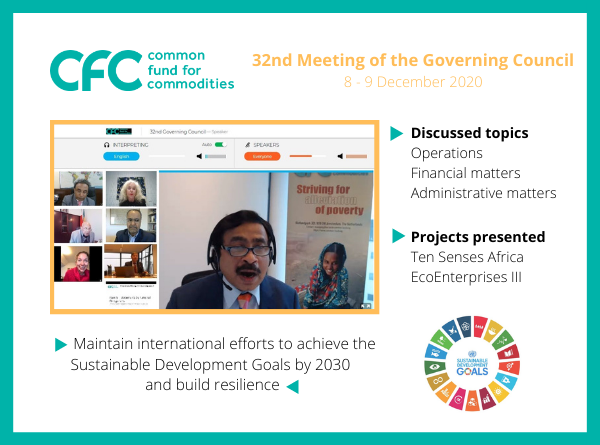32nd Meeting of the Governing Council
The Thirty-Second Annual Meeting of the Governing Council was held on 8 and 9 December 2020. Overcoming the obstacles posed by Covid-19, this meeting was held virtually for the first time ever. The meeting was well attended by Governors; Alternate Governors; and representatives from international organizations, including the Food and Agriculture Organization of the United Nations (FAO) and United Nations Industrial Development Organization (UNIDO).
Mr. Sebastian Lesch, representing the German Federal Ministry for Economic Cooperation and Development (BMZ) delivered the welcome address, highlighting the importance of the work of the CFC, especially during the current challenging times. Millions of small-scale farmers, who are producing agricultural commodities, already lived in poverty before the Covid-19 pandemic. During the pandemic, the situation of many farmers worldwide has worsened. Fast and efficient support is necessary if we don't want to lose what has been already achieved. Mr. Lesch praised the quick efforts of the CFC in launching its Emergency Liquidity Facility a few months after the World Health Organization declared Covid-19 a public health emergency of international concern, providing the much needed support to the commodity producers.
The meeting was chaired by H.E. Mr. Mario Javier Agustin Oyarzábal, Ambassador of the Argentine Republic in the Netherlands. In his opening remarks, Amb. Oyarzábal emphasized the issue of food security, indicating that the FAO estimates that the pandemic may push an additional 130 million people into chronic hunger. As many of these people are smallholder farmers, the CFC must continue and expand its support to the commodity producers, helping them to become more resilient to external shocks and better navigate crises, such as the COVID-19 pandemic.
In his statement, Ambassador Mohammed Sheikh Belal, Managing Director of the CFC, praised all attendees for their presence in these exceptional circumstances. He further addressed the continuous attempts of the CFC to engage in broader partnerships with peers in order to achieve larger impact. For this reason, the CFC has hosted an event with the International Commodity Bodies and has tried to be a regular visitor to the events of other organs of the United Nations such as the United Nations Development Programme (UNDP), FAO, United Nations Conference on Trade and Development (UNCTAD), and the Office of the High Representative for the Least Developed Countries, Landlocked Developing Countries and Small Island Developing States (UNOHRLLS).
Amb. Belal highlighted the consistent work of the CFC during the pandemic, recognizing its endeavors to provide finance for the pursued operation of agricultural value chains. For instance, the Emergency Liquidity Facility (ELF) was operationalized as an instrument to mitigate the impact of the pandemic. Moreover, the Executive Board allowed more flexibility for amending repayment schedules of CFC loans, in compelling cases, such as companies facing difficulties because of the challenges imposed by COVID-19. This enables the CFC to quickly accommodate the short-term needs of the good projects by, for example, postponing repayments during moments of crisis.
Ambassador Belal thanked the council and the Executive Board for their approval to finance 8 projects with an outlay of USD 23.6 million and the CFC contribution of USD 10.9 million. The areas of action in which the CFC has intensified its involvement in 2020 were reviewed and included: gender equality, digitalization, and food security. The Managing Director sought the Council’s consideration for the speedy arrangement for green recovery in the post-pandemic era. He also thanked the Executive Board and updated the council on the workings of the working group on Sustainable fund Management (CIIF). The Managing Director concluded his statement by praising the international efforts brought to overcome these challenging times and to terminate poverty. Maintaining these efforts is therefore essential to achieve the SDGs by 2030.
During the meeting, two projects receiving CFC support were invited to deliver a presentation explaining more about their operations and their involvement with the CFC. Ten Senses Africa (TSA) is a nut processor and trader in Kenya established in 2008; it is the world’s first fair-trade certified macadamia nut company. It sources from 5,000 organic macadamia farmers and employs 100 full-time employees of which 80% are female. With a CFC loan, TSA can upscale and accelerate its business model to include more farmers. The first disbursement of USD 500,000 was made in January 2020, which was used to buy 400MT of raw nuts from 2,500 farmers. TSA will process the nuts to meet client demand in Europe and the United States. As Covid-19 has affected TSA, the CFC facility provided support to maintain operations during this period.
EcoEnterprises III (EcoE III) is an Impact Investing funding targeting Latin American SMEs that source raw material from collectors or smallholder farmers for value-added processing. The sectors of interest are sustainable agriculture, agro-forestry, aquaculture, and wild-harvested forest products. EcoE III strives to invest in growing companies that cater to the increasing demand for organic food products and certified wood in regional markets, and mostly in the United States. The CFC has become a shareholder of EcoE III at its first closure in 2018 and made its first disbursement into the fund in early 2019.
Furthermore, the Governing Council discussed relevant operations and financial matters of the Fund, including the Administrative Budget 2021, the deliberations of the Open-Ended Working Group on sustainable fund management, the decisions taken by the Executive Board during 2020, among others.
With the world experiencing unprecedented challenges and the COVID-19 imposing additional obstacles for the achievement of the 2030 Agenda, it was agreed that the CFC needs to make extra efforts to meet the expectations of its Member Countries. With the guidance of the Governing Council, the CFC hopes to increase its impact, by providing the necessary support to the commodity producers in developing countries.

